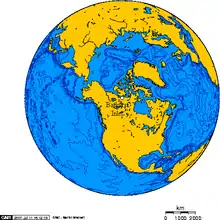Bathurst Inlet
Bathurst Inlet, officially Kiluhiqtuq,[1] is a deep inlet located along the northern coast of the Canadian mainland, at the east end of Coronation Gulf, into which the Burnside and Western rivers empty. The name, or its native equivalent Kingoak (Qingaut, nose mountain), is also used to identify the community of Bathurst Inlet located on the shore. Melville Sound opens into the eastern side of the inlet at Cape Croker, west of the Hurd Islands.
.jpg.webp)


Plans for a deep-water port
A consortium of seven mining companies sponsored environmental impact studies to construct a deep-water port in Bathurst Inlet.[2][3] Their plans included building a 211 km (131 mi) road connecting the port to their mines. The port would serve vessels of up to 25,000 tonnes.
A plan referred to the Nunavut Impact Review Board in May 2004 projected a capacity to moor vessels of up to 50,000 tonnes.[4][5][6] In this earlier plan the Bathurst Inlet Road would be an ice road, like that from Yellowknife, not an all-weather road as in post-2005 proposals, following the failure of the ice road to freeze early enough to allow transport of a whole year's worth of supplies.[2][3][7]
| Corporation | mine site | notes |
|---|---|---|
| Xstrata | Hackett River Mine | Silver and Zinc |
| Sabina Gold & Silver | Back River Project | |
| Zinifex | Izok Lake Mine | Copper and Zinc |
| Rio Tinto | Diavik Diamond Mine | Diamonds |
| Miramar Mining | ||
| Dundee Precious Metals | ||
| BHP | Ekati Diamond Mine | Diamonds |
| De Beers |
In 2008 several of the companies dropped out.[8]
In August 2013 Bathurst Inlet Port & Road (BIPR) Project, a joint venture composed of GlencoreXstrata, Sabina Gold and Silver Corporation, presented continued plans for facilities at the Grays Bay Port that would "include a dock, concentration storage shed, fuel storage facilities and a camp. These facilities will support storage of concentrate, loading of bulk-carrier ships, and re-supply of fuel and goods for the Project." The project that was first proposed in 2003 has been subject to changes in demands made by the Nunavut Impact Review Board regarding Environmental Impact Study.[9]
Environmental issues
Environmental groups have raised concerns over the impact the road would have on the annual migration of the Bathurst Caribou herd.[10][11] There are four barren-ground caribou herds in the Northwest Territories—Cape Bathurst, Bluenose West, Bluenose East and Bathurst caribou herd.[12] The Bluenose East caribou herd began a recovery with a population of approximately 122,000 in 2010,[13] which is being credited to the establishment of Tuktut Nogait National Park. According to T. Davison 2010, CARMA 2011, the three other herds "declined 84-93% from peak sizes in the mid-1980s and 1990s.[12]
In fiction
The proposed deep-water port serves as the basis of location in Don Bassingthwaite's short story, "Too Much Is Never Enough" from the science fiction anthology, Foreshadows: The Ghosts of Zero.
References
- Kiluhiqtuq (formerly Bathurst Inlet)
- Bob Weber (July 4, 2007). "Arctic port plan gathers steam". Toronto Star. Retrieved 2007-07-11.
- Jonathan Ratner (July 5, 2007). "New Arctic port plan for Northern miners". National Post. Archived from the original on November 6, 2007. Retrieved 2007-07-11.
- "Case Study: Bathurst Inlet Port and Road Project". Canadian Environmental Assessment Agency. 2005-05-08. Archived from the original on 2007-03-23. Retrieved 2008-02-01.
- "Social and Economic Considerations for the Arctic Marine Shipping Assessment" (PDF). Integrated Environments. 2008-03-31. Archived (PDF) from the original on 2013-01-19.
- "Bathurst Inlet Port & Road Joint Venture Kitikmeot Region, Nunavut, Canada". Nuna. Archived from the original on 2011-07-14.
-
"Bathurst Inlet Port & Road". Canadian Environmental Assessment Agency. 2008-01-02. Retrieved 2008-02-01.
Federal Responsible Authority(ies) Indian and Northern Affairs Canada and Fisheries and Oceans Canada.
- "Bathurst Inlet road, port project put on hold again: Partners ask Nunavut environmental assessors to delay technical review". CBC News. 2008-08-06. Archived from the original on 2016-02-13.
- "Izor Corridor Project Proposal", MMG, August 2012
- "Briefing Note: Bathurst Inlet Port and Road Project (BIPAR) and impacts on species in the Slave Geological Province (SGP) (NWT and Nunavut)". Canadian Arctic Resources Committee. Archived from the original on 2008-11-20. Retrieved 2008-02-01.
- "Our Programmes: Sustainable Development". Canadian Arctic Resources Committee. Archived from the original on 2007-08-20. Retrieved 2008-02-01.
- Kolpashikov, L.; Makhailov, V.; Russell, D., "The role of harvest, predators and socio-political environment in the dynamics of the Taimyr wild reindeer herd with some lessons for North America", Ecology and Society
- (Adamczewski, J., J. Boulanger, B. Croft, T. Davison, H. Sayine-Crawford, and B. Tracz, In preparation: A Comparison of Calving and Post-calving Photo-surveys for the Bluenose-East Herd of Barren-ground Caribou in the Northwest Territories, Canada in 2010. Department of Environment and Natural Resources, Manuscript Report No. 245, 62 pp.)